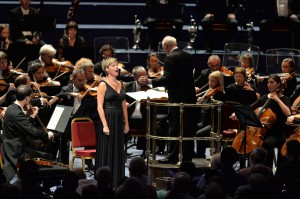Saturday 16 August 2014
A delight as always to welcome Bernard Haitink to the podium and a surprise to find that so renowned a Mahlerian should be conducting the 4th symphony for the first time at the Proms. The combination of Mahler’s Fourth and Schubert’s Fifth Symphonies may look somewhat strange on paper but they work remarkably well in performance. Both symphonies were overlooked for many years and it was not until Charles Grove reintroduced the Schubert in the early years of last century that its popularity began to grow, and enthusiasm for Mahler was only just beginning when I started going to the Proms in 1960. What is more, neither symphony requires trombones, understandable in Schubert but unexpected in Mahler.
Bernard Haitink did not go out of his way to stress the similarities but they grew out of the performances. Though tempi in the Schubert were on the fast side there was an intimacy, a delicacy, throughout which was captivating. The hints of early Beethoven – Schubert’s own orchestra had played the first two symphonies – are there alongside the more obvious Mozart, but above all, the later Schubert is there in essence.
The approach to the Mahler was equally relaxed with wind solos particularly impressive – a lovely bassoon solo in the first movement. There was an innocence to the second movement despite the occasional tensions, but these never resolved themselves into threats. The gentle inevitability of the slow movement was spell-binding with details subtly etched but never over-spun. Camilla Tilling was the soloist for the final movement drawn from Des Knaben Wunderhorn. The programme note implied a potential dichotomy for the composer faced with a vision of heaven which includes death and even Herod, but this has always seemed to me to be the magnificence of the vision which is so inclusive it is forgiving of all. Heaven – this seems to say – is for everyone without judgement, and so it seemed to be for us.

